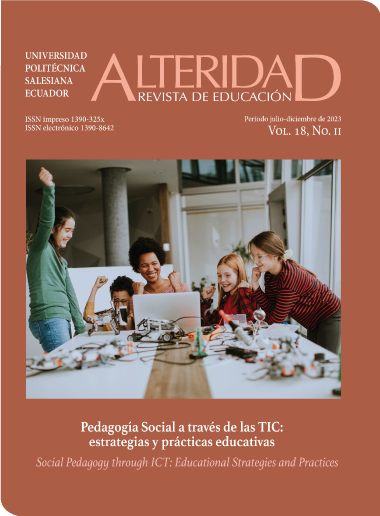Social Pedagogy and Media Arts: innovative proposal for inclusive schooling
Main Article Content
Abstract
Article Details

This work is licensed under a Creative Commons Attribution-NonCommercial-ShareAlike 4.0 International License.
Authorship: The list of authors signing must include only those people who have contributed intellectually to the development of the work. Collaboration in the collection of data is not, by itself, a sufficient criterion of authorship. "Alteridad" declines any responsibility for possible conflicts arising from the authorship of the works that are published.Copyright: The Salesian Polytechnic University preserves the copyrights of the published articles, and favors and allows their reuse under the Creative Commons Attribution-NonCommercial-ShareAlike 3.0 Ecuador license. They may be copied, used, disseminated, transmitted and publicly displayed, provided that: i) the authorship and the original source of their publication (journal, editorial and work URL) are cited; (Ii) are not used for commercial purposes; Iii) mention the existence and specifications of this license.
References
Adell Segura, J. Llopis Nebot, M. Á., Esteve Mon, F. y Valdeolivas Novella, M. G. (2019). El debate sobre el pensamiento computacional en educación. RIED: Revista Iberoamericana de Educación a Distancia, 22(1), 171-186. https://doi.org/10.5944/ried.22.1.22303
Aparicio Gómez, O. Y. (2018). Las TIC como herramientas cognitivas. Revista interamericana de investigación, educación y pedagogía, 11(1), 67-80. https://doi.org/10.15332/s1657-107X.2018.0001.07
Area Moreira, M. (2008). La innovación pedagógica con TIC y el desarrollo de las competencias informacionales y digitales. Investigación en la Escuela, (64), 5-17. https://bit.ly/3ORKmUU
Bambozzi, E. (1993). Teoría y praxis en Paulo Freire [Tesis de Doctorado, Universidad Católica de Córdoba]. Producción Académica UCC. https://bit.ly/3VbltXC
Bernaschina. D. (2019). Las TIC y Artes mediales: La nueva era digital en la escuela inclusiva. Alteridad, 14(1), 40-52. https://doi.org/10.17163/alt.v14n1.2019.03
Bernaschina. D. (2020). Arte digital en la Escuela Especial: Nueva perspectiva de la metodología artística y tecnológica para los estudiantes jóvenes chilenos. Revista de Educación Inclusiva, 13(1), 50-74. https://bit.ly/3wJKZYD
Bernaschina. D. (2021). Interacción pedagógica en las TIC: Mediación inclusiva en el aula virtual. Etic@net: Revista científica electrónica de Educación y Comunicación en la Sociedad del Conocimiento, 21(1), 171-192. https://doi.org/10.30827/eticanet.v21i1.15978
Caparrós Martín, E. y García García, M. (2021). Éticas para la esperanza de una educación inclusiva. Tendencias Pedagógicas, 38, 83-97. https://doi.org/10.15366/tp2021.38.008
Carballo Villagra, P. (2008). Una experiencia de educación popular según premisas de la pedagogía crítica. En M. Gadotti, M. V. Gomez, J. Mafra y A. Fernandes de Alencar (comp.), Paulo Freire. Contribuciones para la pedagogía (pp. 17-28). CLACSO. https://bit.ly/3ed0eny
Caride Gómez, J. A. (2021). Repensando a Paulo Freire como pedagogo-educador social: elogio de un quehacer cívico, educativo y cultural (trans)formador. Tendencias Pedagógicas, 38, 21-36. https://doi.org/10.15366/tp2021.38.003
Chesney Lawrence, L. (2008). La concientización de Paulo Freire. Revista Historia de la Educación Colombiana, 11(11), 53-74. https://bit.ly/3MKcNTa
Cornejo Valderrama, C. (2017). Respuesta educativa en la atención a la diversidad desde la perspectiva de profesionales de apoyo. Revista Colombiana de Educación, (73), 77-96. https://doi.org/10.17227/01203916.73rce75.94
Daniels, H. (2003). Vygotsky y la pedagogía. Paidós. https://bit.ly/3dqmgCt
Echeita Sarrionandia, G. (2017). Educación inclusiva. Sonrisas y lágrimas. Aula Abierta, 46(2), 17-24. https://doi.org/10.17811/rifie.46.2.2017.17-24
Ferreira Galli, E. y Braga Marini, F. (2017). O diálogo transformador a partir da pedagogia da esperança de Paulo Freire. Revista Inter Ação, 42(1), 51-68. https://doi.org/10.5216/ia.v42i1.44030
Freire, P. (1999). Pedagogía de la autonomía: saberes necesarios para la práctica educativa (3ª ed.). Siglo XXI. https://bit.ly/3SKufdQ
Freire, P. (2005). Pedagogía del oprimido (2ª ed., J. Mellado, trad.). Siglo XXI. https://bit.ly/2MfboF0
Freire, P. (2007). La educación como práctica de la libertad (53ª ed., L. Ronzoni, trad.). Siglo XXI. https://bit.ly/3AqacdO
Freire, P. (2012). Pedagogía de la indignación: cartas pedagógicas en un mundo revuelto (A. L. Granero, trad.). Siglo XXI. https://bit.ly/3peqNuw
Gadotti, M. (2006). La pedagogía de Paulo Freire y el proceso de democratización en el Brasil: algunos aspectos de su teoría, de su método y de su praxis. En A. Ayuste (coord.), Educación, ciudadanía y democracia (pp. 39-64). Octaedro. https://bit.ly/3sS1xg0
Gaitán Riveros, C. (2003). El método de Paulo Freire. En M. Gadotti, M. Gómez y L. Freire (comp.), Lecciones de Paulo Freire cruzando fronteras: experiencias que se completan (pp. 211-212). CLACSO. https://bit.ly/3EumdRE
Gil, R. L. y Cortez Morales, A. (2018). Formación docente transformadora para liberar la educación. Paulo Freire y la Pedagogía del oprimido. En R. M. Páez Martínez, G. M. Rondón Herrera y J. H. Trejo Catalán (eds.), Formación docente y pensamiento crítico en Paulo Freire (pp. 24-53). CLACSO. https://bit.ly/3GgJXYo
González-Monteagudo, J., León-Sanchez, M. y Sevillano-Monje, V. (2021). Pedagogia da esperança: memória, escrita experiencial e reflexividade (auto)crítica em Paulo Freire. Revista Internacional de Educação de Jovens e Adultos, 4(07), 34-49. https://bit.ly/3CHLFlx
Granda Asencio, L Y., Espinoza Freire, E. E. y Mayon Espinoza, S. E. (2019). Las TIC como herramientas didácticas del proceso de enseñanza-aprendizaje. Revista Conrado, 15(66), 104-110. https://bit.ly/3vT6AgF
Graviz, A. (2010). Pedagogía mediática-aprendizaje e interculturalidad. Revista de Educación, (1), 97-110. https://bit.ly/38yh6CE
Guioti, E. (2007). Educação a distância: tendências predominantes na sua expansão, Brasil e Espanha [Tese de Doutorado, Pontifícia Universidade Católica de São Paulo]. Repositorio PUCSP. https://bit.ly/3Cfzpap
Guioti, E. y Quintana Albalat, J. (2006, septiembre). Las tecnologías de la información y comunicación en la escuela – contribuciones del pensamiento de Paulo Freire para la superación de desafíos. Memorial Virtual Paulo Freire. https://bit.ly/3CSILKV
Jackiw, E., y Haracemiv, S. M. C. (2021). Educomunicação e alfabetização midiática: diálogos freireanos na América Latina. Práxis Educativa, 16, 1-21. https://doi.org/10.5212/PraxEduc.v.16.16614.031
Latorre, M. y Seco del Pozo, C. (2013). Metodología: Estrategias y técnicas metodológicas. Universidad Marcelino Champagnat. https://bit.ly/3AkH8nC
López, J. O. (2008). Paulo Freire y la pedagogía del oprimido. Revista historia de la educación latinoamericana, (10), 57-72. https://bit.ly/3vWYmUT
López Melero, M. (2012). La escuela inclusiva: una oportunidad para humanizarnos. Revista interuniversitaria de formación del profesorado, 26(2), 131-160. https://bit.ly/3vzSsu3

